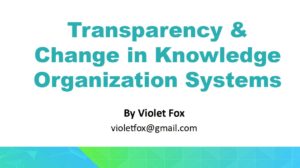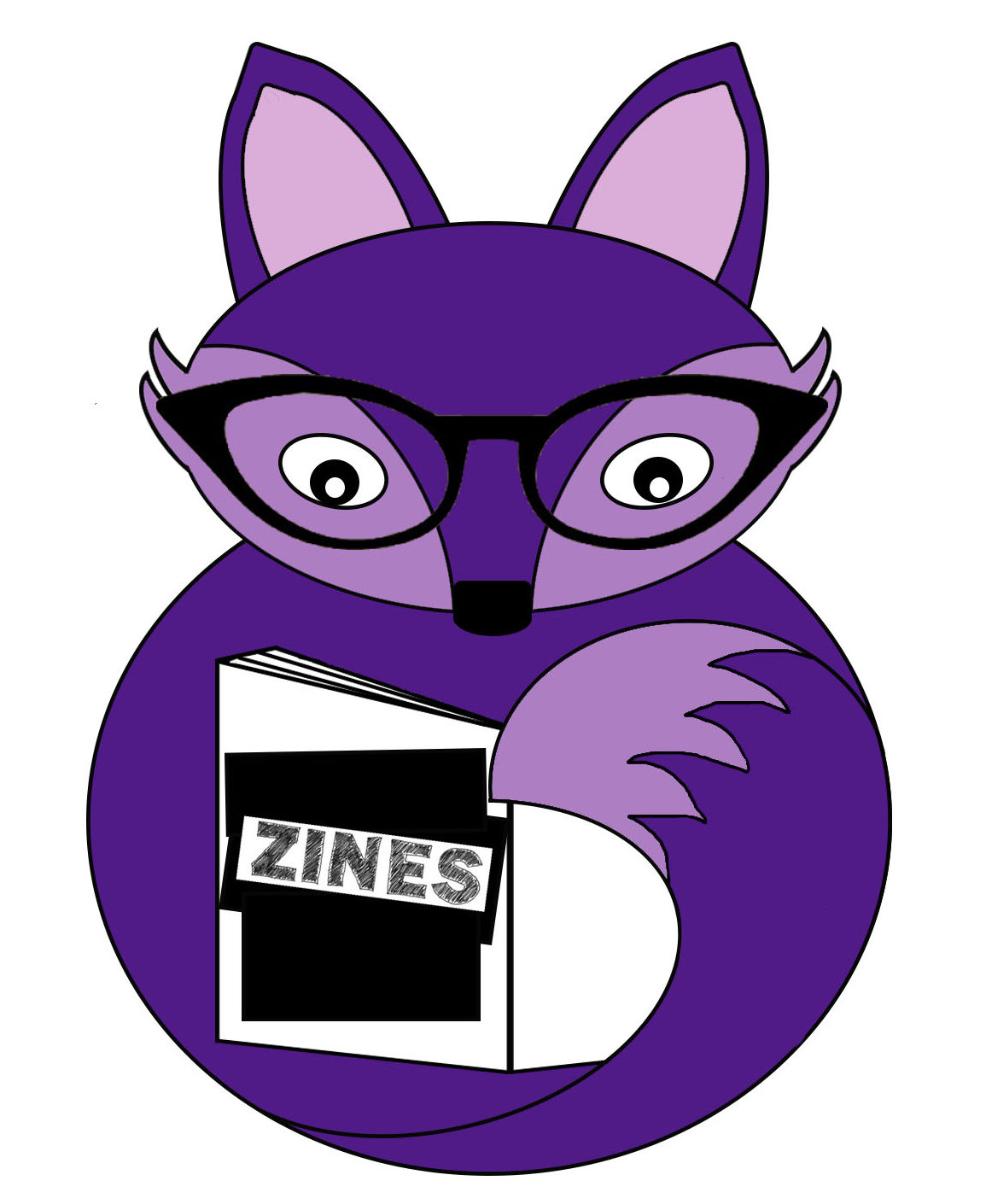Title of talk:
Transparency & Change in Knowledge Organization Systems. This presentation is being given on the topic of change in classification as part of the joint Subject Analysis and Access Section and the Bibliography Section session titled “Subject to Change: How to Deal With Changes in Subject Information” at IFLA/WLIC 2021, August 18 2021
Slides:

Text of talk:
Thank you to the planning committee for the invitation to speak. I have so much respect for the work they’ve done, as well as for the expertise of Tim and Hollie.
To tell you more about myself, last month I started working for the Accessible Book Consortium, which is an international partnership designed to provide greater access to books for people who are blind, have low vision, or are otherwise print disabled. But most of my experience for this talk is related to my previous position. Until last year I was one of the editors of the Dewey Decimal Classification, working for OCLC. My perspective on this work is very much influenced by that experience, which gave me a birds eye view of classification challenges in general.
Transparency of change
Throughout my work on the DDC, I was significantly influenced by Jens-Erik Mai’s 2010 article Classification in a social world: bias and trust. In that article he talks about how a classification could be based on anything, any division or discipline, and be accepted as worthwhile as long as the users of that classification understand and appreciate the reasons behind its structure and categories. He quotes Borges’s famous classification of animals into categories including “those [animals] that have just broken a flower vase”. That classification is just as arbitrary as, say, the Dewey 200s, but, to some extent, it doesn’t matter. He argues that we’ve gone beyond the idea that we could, in any way, build a classification that reflects reality “as it really is”, and instead we should shift our focus to ensuring that the classifications we use can be trusted. Dr. Mai says it’s all about trust. We need to have information about the decisions, principles, and philosophy that have informed the classification, as well as information about the people and organizations behind the system.
That principle of transparency made a lot of sense to me, and impacted my work as one of the editors of Dewey. I worked to make the revision process more transparent, specifically by making the proposals to revise the DDC available for public comment before they were discussed or voted on by Dewey’s Editorial Policy Committee. I did that through a series of explainer blog posts written in easy-to-understand language, describing the process of revising the DDC, the kinds of research that went into making a revision, and the kinds of questions and dilemmas the editors grappled with. I’m sorry that I was laid off and can’t continue that effort.
Changes beyond Dewey
But that doesn’t stop me from working with other classification systems!
As an aside I’ll mention I’ve been interested in zines for many years. Zines are, of course, self-published works that have small printing runs, and are often associated with counterculture or out of the mainstream subjects. I’ve been a zine librarian for about twelve years now, and part of that work has been volunteering with the Anchor Archive Zine Thesaurus, located in Halifax in Canada. It’s been a joy to work with a “non-standard” classification, and get to work with others to grapple with knowledge organization problems for topics such as anarchism and drug use. Our discussions lead to change in real time, which is very exciting!
My experience with cataloging and classifying zines has given me fresh perspectives on my work in libraries, so if you ever get the chance to work with resources that are far from your norm, I would highly recommend it!
Of course another system I’ve worked with is the Library of Congress Classification and Subject Headings. While I was very much an “insider” of the Dewey editorial team, I’ve always been an “outsider” to the Library of Congress processes. And I’ve been able to use that perspective to see where the process of changing is opaque to most of its users, even most librarians. Even the majority of catalogers don’t know how the proposal process for changing Library of Congress Classifications or Subject Headings, which is unfortunate. LC has made some steps towards transparency lately, including publishing a web page that describes the process of how proposals to revise headings are evaluated. I look forward to additional steps to increase the transparency of the process as a whole, and to ensure that librarians and users can easily understand the decisions, principles, and philosophy behind the Library of Congress Classification and Subject Headings.
Systems that enable transparency
I’ve been talking about transparency at the level of the creators and maintainers of knowledge organization systems, but the need for transparency goes beyond that. I would suggest that our systems fail at transparency in maintaining access to the history of the system itself. For example, it’s difficult to know when a particular Library of Congress Classification number was changed, or when a particular subject heading was changed. Ideally, we would have systems that would provide that principle of transparency in the dimension of time as well. We could understand the historical context of particular subject headings. I get really excited about the possibilities here! If we had more complex systems to work within, we could assign terms that would have been appropriate 100 years ago to a book written 100 years ago, but then those terms could be semantically linked to terminology used by library patrons now. We could be freed of the problem of assigning ahistorical terms to older works. But, for now, we’re stuck with flat systems that erase the rich history of the terminology we use.
We also rely on discovery systems which rely on unknowable algorithms that make it impossible to know why we get the results that we do, which erodes trust in our systems. I’d recommend the 2019 book Masked by Trust: Bias in Library Discovery by Matthew Reidsma. In that book, he talks about the black box systems which power discovery layers and provide search results that display the often offensive biases that are revealed when machine learning provides results. In one example, he discusses a library university’s discovery system, where a search for “LGBTQ” brings back results relating to “mental illness”, which is a negative correlation for the algorithm to produce. Masked by Trust is a valuable resource to understanding how these systems work, and how the results they produce are anything but neutral.
The change makers
I’m going to shift topics to talk about another aspect of change in knowledge organization systems, and that is who makes those changes. I would argue that our profession as a whole has not significantly grappled with the questions of who should be making decisions about our classifications, and how those classifications should be funded.
Funding change
I’m speaking specifically from the U.S. perspective here, to say that there’s a lot of calls for free, open cataloging rules and classification standards, because library budgets are very tight, and it’s hard for libraries to justify paying for up-to-date rules about metadata. People in libraries complain about the cost of paying for access to the newest version of Dewey. And it is definitely true that if libraries have to pay for classification schemes or cataloging rules, there will inevitably be inequity in access, where only the globally rich libraries will be following the current standards, and inconsistencies will collect in the descriptions of library resources from libraries with different funding capacities.
But metadata that is up-to-date requires frequent revision, and there’s a limit to how much volunteer effort can be expended in the maintenance of very large, very complex classification systems, especially when budget cuts mean library workers are already overextended. Here in the U.S., cataloging departments have been steadily defunded over the past few decades, and their work outsourced for efficiency’s sake, leaving fewer experts to make classification decisions in individual libraries and library systems. At a time when there are calls for greater responsiveness to the needs of our multicultural patrons, we have fewer people who can make the kinds of critical decisions that are necessary to represent resources ethically.
The other route we’ve taken in the U.S. is having classification decisions made by the Library of Congress, and I think recent history, of the last five years, has really shown us the limitations of relying on a government agency to make those decisions.
The most obvious example, of course, is the LC Subject Heading “Illegal aliens,” which is still in catalogs around the world, five years after LC announced they would change the heading, and four years after the American Library Association called the heading “dehumanizing, offensive, inflammatory, and even a racial slur”. The fact that the Library of Congress has not made an official statement on the status of those headings since 2016, for fear of political backlash, demonstrates that political interests can be detrimental to transparency and trust.
But even beyond that one example, the pitfalls of tying our classification standards to the limitations of a government agency are clear, as in the case of the subject heading “Armenian massacres, 1915-1923” which was only changed to “Armenian Genocide, 1915-1923,” in 2020, a year after the U.S. Congress voted to officially recognize that there had been a genocide in Armenia. Only 33 countries have officially recognized that genocide, so this is not simply a U.S. problem, it’s a problem of diplomacy and the restrictions that come from tying a classification to an official government perspective.
Changing perspectives
In this presentation I outlined a number of problems and given us very few quick solutions to moving forward, for which I’m sorry! I don’t have easy answers! But I do think these are valuable questions for us to ask, and I hope that my perspective is unique enough to be interesting. Mostly, I think the perspectives that we need to change are our own perspectives, as catalogers, as librarians, and shift from thinking that knowledge organization problems are someone else’s problem. The catalog represents the library, whether we like it or not, so every library worker has responsibility for what is displayed there.
I’d like to leave the final words of this presentation to Octavia Butler, who wrote several works which, although they are fiction, are almost spooky in their prescience. This snippet is from her incredible book, Parable of the Sower, and is at the heart of the religious movement in the work, called Earthseed.
Consider: Whether you’re a human being, an insect, a microbe, or a stone, this verse is true.
All that you touch
You Change.
All that you Change
Changes you.
The only lasting truth
Is Change.
— Octavia E. Butler, Parable of the Sower
